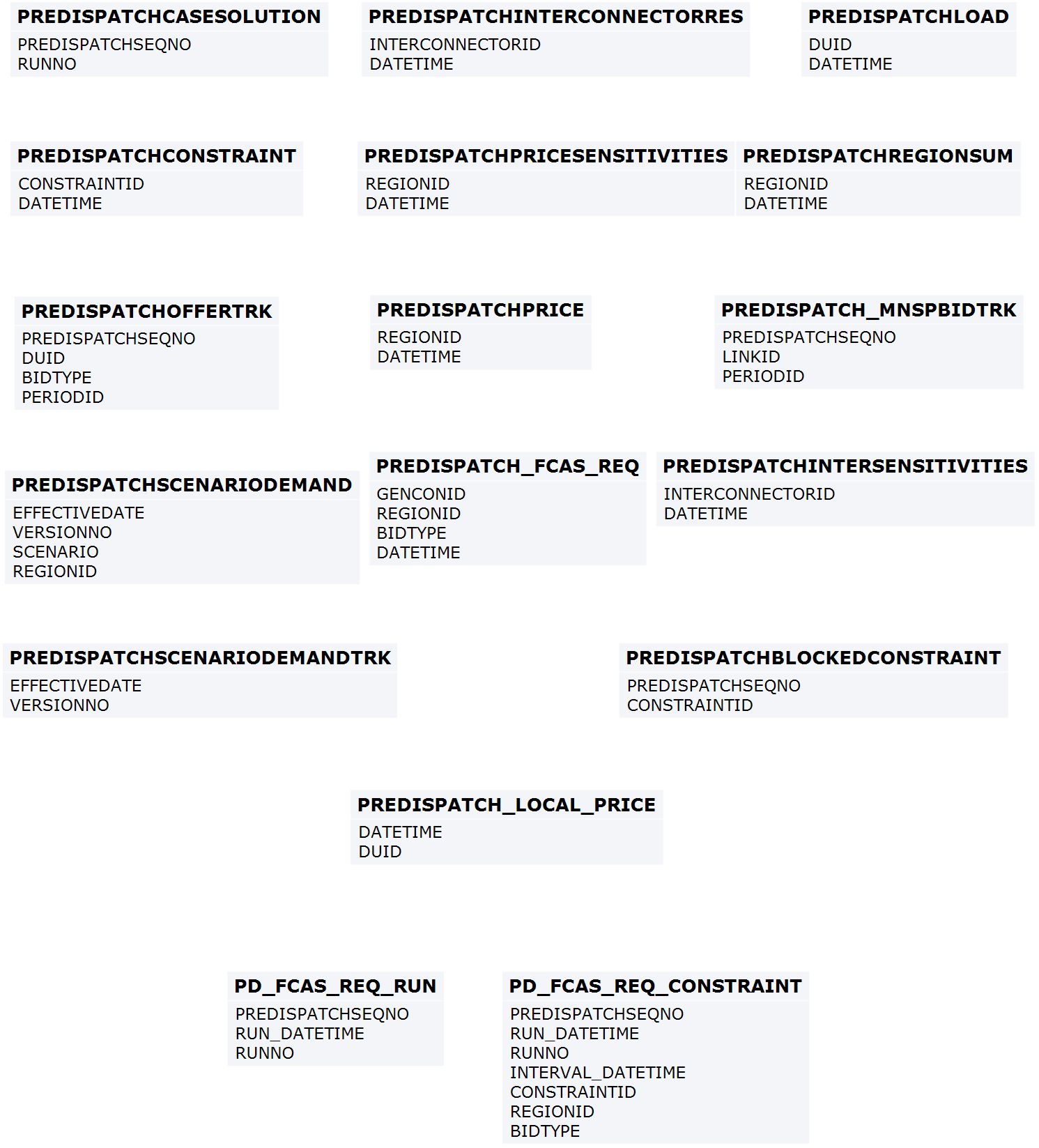
|
Name |
|
|
Comment |
Results from a published Predispatch Run |
|
Name |
Comment |
Visibility |
|
The constraint level FCAS cost / price details for constraint FCAS processor runs. This enhanced output table format is established for the constraint FCAS processor release required for the Frequency Performance Payments (FPP) release. This enhanced output is hierarchical in nature, with the parent *_FCAS_REQ_RUN table holding the details about the triggering case run and time, and the child *_FCAS_REQ_CONSTRAINT table holding the constraint level details of FCAS costs / prices. |
Public |
|
|
The constraint FCAS processor run details. This enhanced output table format is established for the constraint FCAS processor release required for the Frequency Performance Payments (FPP) release. This enhanced output is hierarchical in nature, with the parent *_FCAS_REQ_RUN table holding the details about the triggering case run and time, and the child *_FCAS_REQ_CONSTRAINT table holding the constraint level details of FCAS costs / prices. |
Public |
|
|
Uniquely tracks which Intermittent Generation forecast run (from INTERMITTENT_GEN_FCST_RUN) was used for the DUID in which Pre-dispatch run. |
Private & Public Next-Day |
|
|
Uniquely tracks which Rooftop PV forecast run (from ROOFTOP_PV_FCST_RUN) was used for the Area in which Pre-dispatch run. |
Public |
|
|
Sets out local pricing offsets associated with each DUID connection point for each dispatch period |
Private & Public Next-Day |
|
|
PREDISPATCH_MNSPBIDTRK shows the MNSP bid tracking, including the bid version used in each predispatch run for each MNSP Interconnector Link. PREDISPATCH_MNSPBIDTRK shows the audit trail of the bid used for each predispatch run. |
Public |
|
|
PREDISPATCH Blocked Constraints lists any constraints that were blocked in a Predispatch run. If no constraints are blocked, there will be no rows for that predispatch run. |
Public |
|
|
PREDISPATCHCASESOLUTION provides information relating to the complete predispatch run. The fields provide an overview of the dispatch run results allowing immediate identification of conditions such as energy or FCAS deficiencies. |
Public |
|
|
PREDISPATCHCONSTRAINT sets out constraints that are binding in each predispatch run and interconnector constraints (whether binding or not). Only binding and interconnector constraints are reported. Binding contracts have marginal value greater than $0. Interconnector constraints are listed so RHS values can be reported for ST PASA. |
Private & Public Next-Day |
|
|
PREDISPATCHINTERCONNECTORRES records Interconnector flows and losses for the periods calculated in each predispatch run. Only binding and interconnector constraints are reported. |
Public |
|
|
PREDISPATCHINTERSENSITIVITIES sets out the sensitivity flows for each interconnector by period. |
Public |
|
|
PREDISPATCHLOAD shows pre-dispatch targets for each dispatchable unit, including additional fields to handle the Ancillary Services functionality. No record is written where a unit is not dispatched. PREDISPATCHLOAD shows all the results for each period. |
Private & Public Next-Day |
|
|
PREDISPATCHOFFERTRK is for the ancillary service bid tracking of predispatch processing. PREDISPATCHOFFERTRK identifies which bids from BIDDAYOFFER and BIDOFFERPERIOD were applied for a given unit and ancillary service for each predispatch run. |
Private & Public Next-Day |
|
|
PREDISPATCHPRICE records predispatch prices for each region by period for each predispatch run, including fields to handle the Ancillary Services functionality. |
Public |
|
|
PREDISPATCHPRICESENSITIVITIES sets out the sensitivity prices for each region by period. |
Public |
|
|
PREDISPATCHREGIONSUM sets out the overall regional Pre-Dispatch results for base case details (excluding price). |
Public |
|
|
PREDISPATCHSCENARIODEMAND defines the demand offsets that are applied for each of the predispatch sensitivity scenarios. |
Public |
|
|
Tracks the predispatch scenario offset updates across time |
Public |
 |
|
|
|